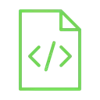
مشروع المؤذن الآلي باستخدام الأردوينو
.jpg)
مع التطور المستمر في التكنولوجيا وتطبيقاتها في حياتنا اليومية، أصبح من الممكن تسخير الأنظمة الذكية لتسهيل المهام وتوفير حلول مبتكرة. مشروع المؤذن الآلي باستخدام الأردوينو هو أحد هذه المشاريع التي تهدف إلى دمج التكنولوجيا مع احتياجات المجتمع.
Project Video
Overview

في هذا المشروع، سوف نقوم ببناء دائرة تعمل كمؤذن آلي في المساجد ودور العبادة، حيث عندما يحين وقت الصلاة، تقوم بإطلاق صوت أذان (مسجل مسبقًا) عبر السماعة لتنبيه السامعين. استخدمنا موديول RTC مع الأردوينو حتى يعرف الأردوينو الوقت بدقة من خلاله، كما استخدمنا موديول MP3 لقراءة الملفات الصوتية من بطاقة الذاكرة.
Getting the Items
Steps
في البداية، قم بإحضار بطاقة ذاكرة، ومن ثم قم بتهيئتها، (مسح البيانات المخزنة عليها). بعد ذلك، قم بتحميل ملف صوت الأذان من المصادر في الأسفل، وقم بنسخه في بطاقة الذاكرة، ثم قم بإخراجها من الحاسوب ووضعها في موديول MP3.

Wiring it Up

قم بتوصيل الأسلاك بين موديول MP3، وموديول RTC، والشاشة الكريستالية، ولوحة الأردوينو كما هو موضح في الصورة أدناه.

التوصيلات من الاردوينو الى لوحة التجارب :
• منفذ ال 5 فولت ← المنافذ الموجبة بلوحة التجارب
• منفذ الجراوند ← المنافذ السالبة بلوحة التجارب
التوصيلات من موديول الRTC :
• المنفذ الموجب من موديول الRTC ← المنافذ الموجبة بلوحة التجارب
• المنفذ السالب من موديول الRTC ← المنافذ السالبة في لوحة التجارب
• منفذ SDA من موديول الRTC ← منفذ رقم A4 في لوحة الأردوينو
• منفذ SCL من موديول الRTC ← منفذ رقم A5 في لوحة الأردوينو
التوصيلات من موديول الMP3 :
• منفذ الVCC من موديول الMP3 ← المنافذ الموجبة بلوحة التجارب
• منفذ الGND من موديول الMP3 ← المنافذ السالبة في لوحة التجارب
• منفذ الTX من موديول الMP3 ← منفذ رقم 10 في لوحة الأردوينو
• منفذ الRX من موديول الMP3 ← الطرف الأوسط بين المقاومة 1 كيلو أوم والمقاومة 680 أوم
• الطرف الأول للمقاومة 1 كيلو أوم ← المنافذ السالبة بلوحة التجارب
• الطرف الأخر للمقاومة 680 أوم ← منفذ رقم 11 في لوحة الأردوينو
• منفذ الSPK_1 من موديول الMP3 ← الطرف الأول من السماعة
• المنفذ SPK_2 من موديول الMP3 ← الطرف الثانى من السماعة
التوصيلات من الشاشة الكريستالية:
• المنفذ الموجب للشاشة الكريستالية ← المنافذ الموجبة بلوحة التجارب
• المنفذ السالب للشاشة الكريستالية ← المنافذ السالبة بلوحة التجارب
• المنفذ SCL للشاشة الكريستالية ← منفذ رقم A5 فى لوحة الاردوينو
• المنفذ SDA للشاشة الكريستالية ← منفذ رقم A4 فى لوحة الاردوينو
Coding
في البداية، قم بتحميل الكود البرمجي الأول الخاص بإعداد الوقت والتاريخ، ثم افتح الشاشة التسلسلية واختر معدل نقل البيانات 57600. تأكد من أن بيانات الوقت والتاريخ تُطبع بشكل صحيح على الشاشة التسلسلية، ثم ارفع الكود البرمجي الخاص بالمؤذن الآلي إلى لوحة الأردوينو.

Testing it Out

بعد رفع الكود البرمجي على لوحة الأردوينو، ستلاحظ طباعة الوقت والتاريخ على الشاشة الكريستالية. عند حلول وقت إحدى الصلوات الخمس (الفجر، الظهر، العصر، المغرب، العشاء)، يتم عرض اسم الصلاة على الشاشة الكريستالية، وتشغيل صوت الأذان عبر السماعة.











.png)





